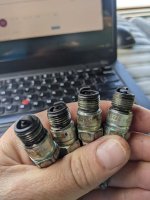Tail_Gunner
Admiral
- Joined
- Jan 13, 2006
- Messages
- 6,237
Be inquisitive, start a 4 degrees and work the timing up slowly until the "marbles" start. That is detonation and you engine will not withstand that. Timing and carberation go hand in hand. Because your advanced timing cured a bog I highly suspect you have a carb problem.If I set my static timing to 4* my total timing ends up being ~28*, and my max rpms are ~3600-3700 rpm, which makes sense when I look at the spec on timing for a below 0C856558 serial number motor. The boat runs fine just doesn't have any top end.
What I really would like to know is why is there such a big difference in the called for timing on early 140 motors vs late motors? My gut feeling here is the Delco EST just doesn't have the timing advance range needed to have both good timing down low and enough timing for 4000+ rpm for the early model 140 engines.
If that is the case it is fine I just want to know that is what caused my motor to go from 4400 rpm at WOT to 3600 RPM at WOT when the only change was the Delco EST and base timing set at 1*.
I am going to play with it more and see if I can find a happy place without knock and still having some top end.
The timing setting discrepancies are due to compression ratios or head design. I believe Achris has pointed that out.
And your prop size, that cam be quite a thing with boats, it could very well be the entire problem.




















